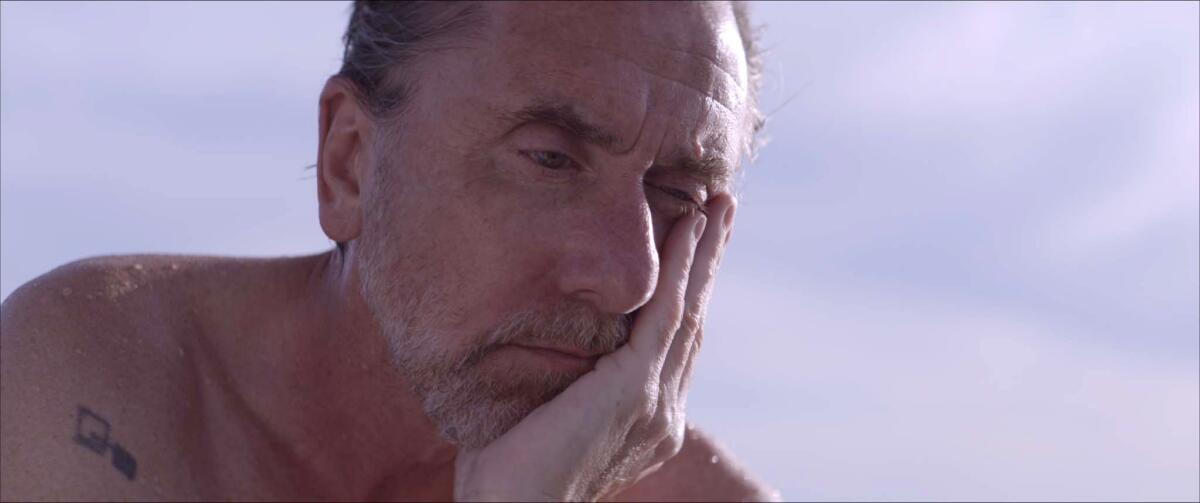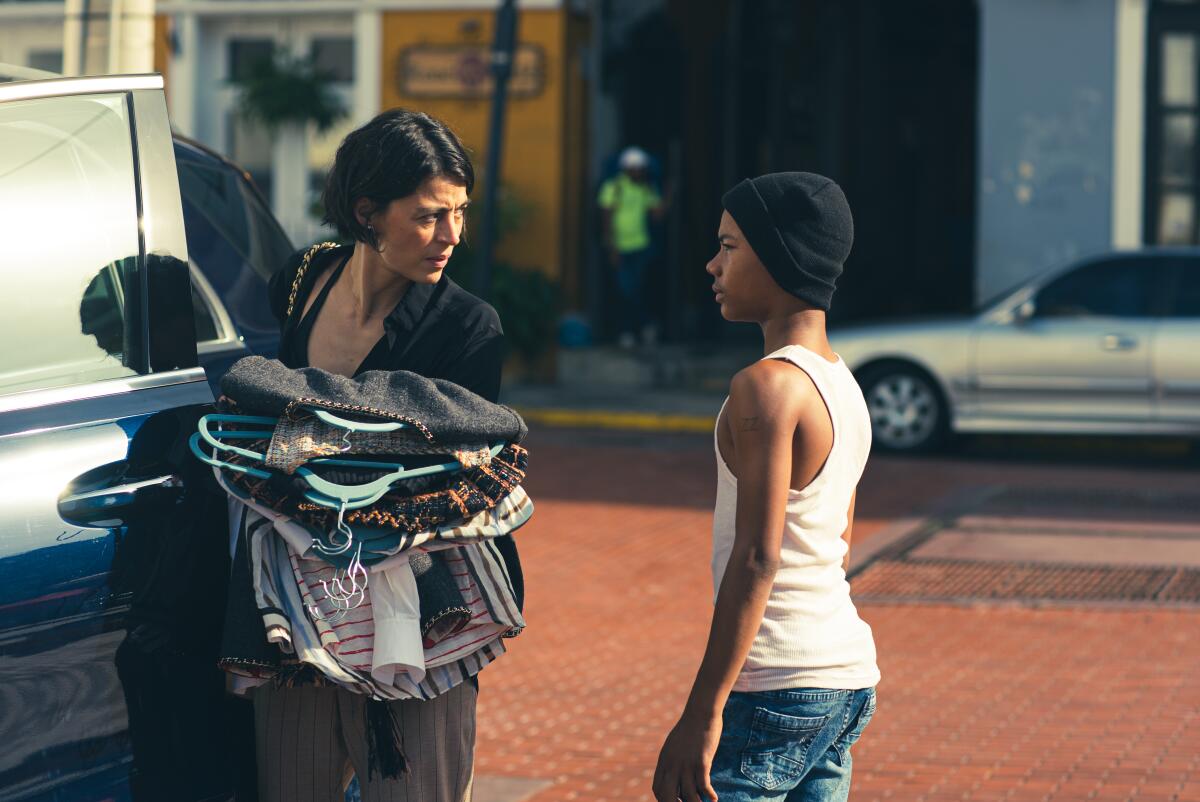Virtual Sundance wraps up
- Share via
Hello! I’m Mark Olsen. Welcome to another edition of your regular field guide to a world of Only Good Movies.
Only good movies
Get the Indie Focus newsletter, Mark Olsen's weekly guide to the world of cinema.
You may occasionally receive promotional content from the Los Angeles Times.
The Sundance Film Festival will soon be wrapping up, as this year’s virtual edition heads into its final days. The series of panel discussions sponsored by The Times are all now available online and include conversations about “Nanny,” “Alice,” “Sharp Stick,” “God’s Country” and “Am I OK?”
Justin Chang wrote an overview of some highlights from the earlier part of the festival, including “Fire of Love,” “When You Finish Saving the World,” “Tantura,” “A Love Song,” “Good Luck to You, Leo Grande,” “Call Jane” and “Happening.”
Lorraine Ali reviewed W. Kamau Bell’s four-part documentary series, “We Need to Talk About Cosby,” which reckons with the cultural aftermath of Bill Cosby, noting, “Comedian and host Bell wrestles with our dueling images of Cosby the Black pioneer and cultural icon and Cosby the alleged serial sexual predator. Can and should we separate the man from his art? What is his effect on generations of Black Americans? And can we honor pieces of his shattered legacy while still recognizing the damage he wrought? Nothing is tied up in a neat bow, and that’s largely what’s so engrossing about this series. It struggles, like the rest of us, with where to put Cosby.”
Fidel Martinez spoke to filmmaker Isabel Castro about her documentary “Mija,” which centers on two American-born daughters of undocumented parents pursuing their dreams in the music business while dealing with the pressures of their families. As Castro said, “It’s the absolute highlight of my entire career to hear people say that they feel seen in this film because it was really important to me to create something that addressed some of the themes and questions that we all grapple with but don’t have proper representation of those stories on the screen.”
Ryan Faughnder took a look at what the streaming ecosystem means for the business of independent film, as filmmakers and producers adjust to the new realities of what to expect for the work beyond the festival circuit.
And there is still more Sundance coverage to come, including an overview of the best of the fest from myself, Justin Chang, Jen Yamato and Geoff Berkshire and the announcement of the festival’s award winners later on Friday.
This week on the awards front, the PGA, DGA and WGA all announced their nominations. Glenn Whipp took note of guild voters going for titles such as “Dune,” “Licorice Pizza,” “The Power of the Dog” and “Belfast” over such well-reviewed hits as “Spider Man: No Way Home” or “No Time To Die,” saying, “Judging from these groups’ slates, it would appear that reflecting the tastes of moviegoers — particularly from the PGA, a body that has recognized box office hits in the past — is pretty low on the priority list this awards season.”
With voting underway for the Academy Awards nominations, Justin Chang wrote about what his Oscar ballot would look like. He also urged voters to look beyond the borders of American, English-language filmmaking in making their selections, saying, “What would the Oscars look like if the academy — and the journalists who cover it — began each awards season by regarding the worthiness of movies from other countries not as an exceptional circumstance, but as a basic, uncontroversial given? In a resurgent, all-around exceptional year for world cinema, ‘Drive My Car’ should hardly be the sole beneficiary: What if movies as smart, tender and moving as ‘Parallel Mothers,’ ‘Petite Maman’ and ‘The Worst Person in the World’ were legitimately in the best picture conversation?”
For those who feel safe doing so, there are some very exciting movies screening in Los Angeles this week. Francis Ford Coppola’s 1974 film “The Conversation,” starring Gene Hackman, returns in a new 35-mm print. The film also brought Kenneth Turan back to the pages of The Times, as he wrote, “The heart of ‘The Conversation’s’ appeal, then and now, is the way it combines an exceptional character study, a thriller plot and an ability to superbly convey the unease of a society where blanket surveillance is getting to be the norm.”
The New Beverly will screen a rare 35-mm print of Prince’s stellar 1987 concert film “Sign ‘O’ the Times” on Friday, Saturday and Sunday.
The American Cinematheque will have a screening of the 1972 Joan Didion adaptation “Play It as It Lays” on Friday night. Then next week they will be launching a monthlong retrospective of Sidney Poitier movies.
Keep up with these screenings and more in Matt Cooper’s always-helpful list of classic movies playing L.A.
Enjoying this newsletter? Consider subscribing to the Los Angeles Times
Your support helps us deliver the news that matters most. Become a subscriber.
‘Introduction’
The latest from Hong Sang-soo, “Introduction” finds the prolific Korean filmmaker working as director, writer, producer, editor, composer and, for the first time, cinematographer. The film picked up a screenplay prize when it premiered at last year’s Berlin Film Festival. Told in three chapters, the film concerns the confusions of a young man named Young-ho, played by Shin Seok-ho. The film is playing in limited release.
For The Times, Justin Chang wrote, “Each of the three stories in ‘Introduction’ — presented in an order that we shouldn’t assume to be chronological — features a mix of men and women, and of artists and non-artists. But the most important dynamic Hong seems to be exploring here is a generational one. … Does the title of this lovely, dryly funny, sneakily resonant movie refer to the various interactions between characters meeting for the first time? Or could it also describe a gesture of mentorship in which an older person takes a younger one under a wing, if not always as kindly or gently as that sounds? God only knows.”
For the New York Times, A.O. Scott wrote, “The title may refer to Youngho’s stage of life, at the beginning of adulthood, or to the fact that in each chapter, acquaintances are made or renewed. The movie may also be intended to serve curious viewers as a point of entry into Hong’s sprawling and addictive body of work. But like his film from last year ‘The Woman Who Ran,’ it strikes me as more of a deep cut for devotees. In the midst of everything else, some of us crave a glass of soju and a stroll on an icy beach where the forecast is for romantic disaffection and wary politeness punctuated by sudden squalls of feeling. It’s a taste worth acquiring.”
For IndieWire, David Ehrlich wrote, “Slight and discursive even by the filmmaker’s idiosyncratic standards, ‘Introduction’ refuses to auto-correct for anyone who doesn’t already speak conversational Hong. Which isn’t to suggest the uninitiated will find any of it particularly hard to follow, only that the movie could well be over before they recognize how its mundane detours have thawed into destinations of their own. Mileage varies when it comes to mapping the border between ‘Minor Hong’ and ‘Major Hong,’ but some of his films — simply by virtue of his generative process — tend to feel like glorified DLC [downloadable content] for the previous efforts. Some of his films are less compelling for the stories they tell than they are for the dimensions they add to the ones he’s already made. This is one of those.”
For Variety, Jessica Kiang wrote, “It’s the manner of Hong’s presentation that makes his films so scintillating, or so infuriating if you’re on the other side of the Great Hong Divide (crossing over is possible — I’ve done it myself — but be warned, like a taste for olives or salted licorice, there’s no going back). … But this tiny little movie makes seemingly effortless work of convincing us that a comment, a story, a film and maybe even a whole filmography can be both important and casual — in Hong’s case, radically casual — at the same time. It makes ‘Introduction’ as bracing as a brief dip in a freezing sea after a rather too soju-soaked luncheon.”

‘Sundown’
Mexican filmmaker Michel Franco premiered his latest “Sundown” at last year’s Venice Film Festival. In the film, Tim Roth plays a wealthy man named Neil Bennett, who is on vacation in Acapulco with his family when Allison Bennett (Charlotte Gainsbourg) is suddenly called home and he enigmatically opts to stay behind. The film is in limited release.
For The Times, Robert Abele wrote, “It’s risky to put so emotionally disengaged a character at the center of a suspense film, but Roth is no ordinary actor, effortlessly bringing a mysterious heft to what looks like someone avoiding something but also giving in to something. Roth’s always been equally powerful with inexpressive roles as the showier, volatile ones, and this being his second quietly intense portrayal for Franco — the first being 2015’s ‘Chronic,’ in which he played a dedicated, depressed nurse — indicates a distinct, fertile director-actor bond one hopes will continue.”
For the New York Times, Beandrea July wrote, “Neil is nothing if not brief — the number of lines he has might add up to a paragraph in the entire film. We can barely get a good look at him; his first close-up doesn’t appear until nearly halfway through the film. … Ultimately what ‘Sundown’ is most successful at revealing to us is the look of Acapulco itself. By the end, [cinematographer Yves] Cape has captured how the sun strikes this spot of Pacific Coast in a dozen different ways. If only the same amount of light had been shed on any of the characters. Without that, an Acapulco sunburn is likely to elicit more feeling than ‘Sundown’ does.”
For the AP, Lindsey Bahr wrote, “What’s extraordinary about ‘Sundown’ is just how little it tells you, how little you get to know the characters, how little actually happens and yet how wholly captivating it is as your mind spins trying to figure out what Neil is doing and how you feel about it too: confusion, frustration, rage, jealousy, admiration or all of the above? He doesn’t care when he returns to his room to find all his possessions stolen. In fact, he tells Alice that he wants to give up his shares in the family company. … Ah, you start to think, this isn’t ‘The White Lotus,’ this is Season 8 of ‘Succession.’ … Ultimately, ‘Sundown’ is more of a spiritual sister to ‘Melancholia’ with shades of ‘Somewhere.’ It is a portrait of a body whose soul has long since departed.”

‘Plaza Catedral’
Directed by Abner Benaim, “Plaza Catedral,” Panama’s shortlisted entry for the international feature Academy Award, is named for a popular square in Panama City. In the film Alicia (Ilse Salas) is mourning the death of her son when she encounters a 13-year-old who goes by Chief (Fernando Xavier De Casta), pulling her back into the world. The vibrant De Casta tragically died after filming was completed, giving the film an additional tragic pall. The movie is playing in limited release.
For The Times, Carlos Aguilar wrote, “‘Plaza Catedral’ is built from atmospheric moments through the combination of cinematographer Lorenzo Hagerman’s melancholy-tinged shots emphasizing the actors’ faces and composer Matthew Herbert’s eerily sharp score. The film carries a notable sense of place, making the urban area a mix of colonial structures, modern buildings and marginalized neighborhoods. … Locations speak volumes regarding the themes, and the titular plaza acts as the middle ground.”
For Variety, Jessica Kiang wrote, “While ‘Plaza Catedral’ never lapses into sentimentality, as Alicia’s unexpected and volatile connection to Chief evolves to provide her with the redemption perhaps even she does not know she is seeking, the truthfulness of the performances renders it moving and genuine, despite the inherent problematics of its focus on the poor boy primarily as an agent of change for the well-off woman.”

Only good movies
Get the Indie Focus newsletter, Mark Olsen's weekly guide to the world of cinema.
You may occasionally receive promotional content from the Los Angeles Times.




